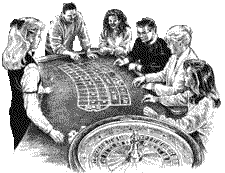 |
 |
Online Roulette | Roulette History
History of Roulette
Roulette is one of the oldest casino games and it is steeped in history. We take a look it's colourful past and the origins of this popular game.
 Roulette is the oldest casino game still in existence. For nearly 300 years the game of roulette has fascinated casino clientele. No one really knows all of the facts of its origin and development; some structure of the game is as old as the "wheel" itself. The word roulette is French, and means "little wheel". Between the 17th & 18th centuries appeared in numerous versions of roulette a Europe. History narrates that Blaise Pascal, who was a French scientist and also a mathematician invented the apparatus in 1657. Up to then the only game that had any similarities in regard to a spinning ball and a rotating horizontal wheel, was the game called "roly-poly." However, in 1720 the Gaming Acts of 1739 and 1740 banned roly-poly, as well as other games of chance, in England. Roulette is the oldest casino game still in existence. For nearly 300 years the game of roulette has fascinated casino clientele. No one really knows all of the facts of its origin and development; some structure of the game is as old as the "wheel" itself. The word roulette is French, and means "little wheel". Between the 17th & 18th centuries appeared in numerous versions of roulette a Europe. History narrates that Blaise Pascal, who was a French scientist and also a mathematician invented the apparatus in 1657. Up to then the only game that had any similarities in regard to a spinning ball and a rotating horizontal wheel, was the game called "roly-poly." However, in 1720 the Gaming Acts of 1739 and 1740 banned roly-poly, as well as other games of chance, in England.
A ground-breaking Beau Nash, the Master of Ceremonies at Bath, England, evaded these laws by introducing "EO." EO, or even-odd, was a easier adaptation of the game, but that too was banned in 1745. During the next 50 years, the game changed into the one that we recognize today. These modern wheels appeared in Paris casinos around 1796 and enclosed all of the familiar elements that continue to exist today; the alternating red and black colors, the layout of numbered pockets 1 through 36, the 0 and the 00. The only difference is the single zero that was in red color and the double zero that was black color. To make it ease and avoid confusion, the color "green" was finally assigned to the zeros.
This adaptation of roulette found its way over to the U.S. by way of Europeans in New Orleans in the early 1800's. Some proprietors, not content with a big 5.26% edge, experimented with wheels containing 31 pockets. These wheels were numbered 1 through 28, with a 0, 00 and an "Eagle" pocket. These proprietors paid out only 26 to 1 for a single number win (30 to 1 is the fair pay out). This translates into a whooping 12.90% house edge! People soon stopped playing these wheels in favor of the original double zero wheels.
In the meantime, back on the "continent," two groundbreaking brothers from France, went in the opposite direction. Francois and Louis Blanc introduced the first single zero roulette wheel in 1842. Leaving France, where gambling was illegal, they set up a house in Germany. The new single zero wheel, with a 2.70% edge instead of the double zero's 5.26% edge, was an instant hit. When gambling was outlawed in Germany, Louis Blanc accepted an invitation from the Prince of Monaco, Charles II for a cost of 2 Million Francs, and established the magnificent casino that sets all the standards in Europe.
Although both the double and single zero wheels originated in France, the double zero became known as the "American Wheel," because it survived in the states. The fame of the single zero wheel had supplanted the double zero wheels in Europe and as a result dubbed the "French Wheel". In Europe, the option of "En Prison" was presented, further lowering the house edge, on even money wagers, down to 1.35%! No wonder the game accounts for over 50% of revenues in European casinos as compared to about 5% in U.S. casinos. Today, in Atlantic City casinos, do offer En Prison for even money bets on double zero wheels. This efficiently reduces the casinos' edge from 5.26% to 2.63% for those bets.
Roulette did enjoy reputation stateside around the turn of the century up until World War II. As Americans learned to lose less at craps and as a result became interested in the concept that black jack was beatable, roulette declined in reputation.. It is possible that with the emergence of more single zero wheels in the United States, and a well informed gambling public, the game may enjoy resurgence in popularity.
|
 |